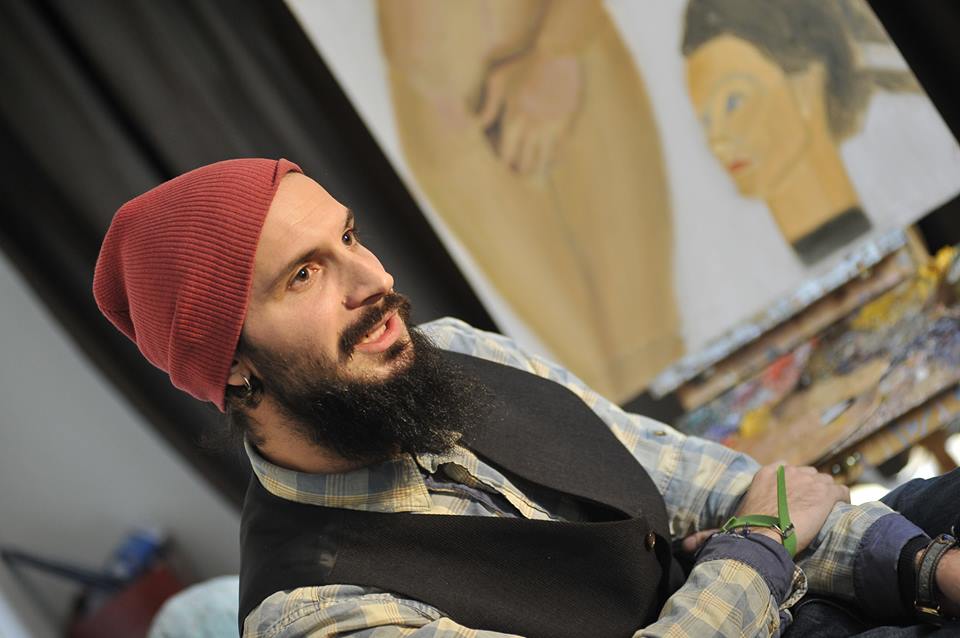Painting as an Art of Touch
If he wasn’t an artist, he’d fancy himself a movie director. He would gladly live in a province of France for a little while. Before, he was afraid of vanishing after his death, but he accepted and eventually got used to that idea. He considers fighting nonsensical, something people waste a lot of time and energy on. He isn’t much for holding grudges and forgives all that he can. He takes pleasure in experimentation, in participating. He doesn’t judge others for lying since he considers both behaviors inherently human, and he likes it when people start a sentence with the words “In my opinion…”
Irakli Jgenti caught my attention on social media – the young artist’s unusual points of view on ordinary circumstances were immediately arresting. I visited him in his workshop and we conversed about art and life in general. After I returned, I had one phrase stuck in my head that he had uttered: “It is time for me to stop destroying my life by searching for answers to questions I know I won’t find.” His view on happiness is similarly curious: “I do not know what happiness is… probably a form of inner peace and nothing more. I achieve it sometimes, in moments when I forgive myself for being human.”
He was born in Tbilisi and brought up in a family of artists. His decision to start painting came unconsciously; he overcame the childish protest he nurtured against following in his family’s footsteps quite late in life. He thinks that painting chose him. An impromptu sketch with a pen and paper four years ago was what jump-started it all; the process proved to be so engrossing that he hasn’t stopped since. “I think I realized that no one else will draw what I have to draw. My family members have their thing to say, I have mine.” He currently studies Sculpting in the Academy of Arts, although his true passion is traditional painting.
There are no normal or special days for him. And while he realizes he may lead a life some may consider boring, to him the everyday routine is anything but. He is constantly in the search for discoveries. He paints 6 to 7 hours a day and, in his own words, he is both the observer and the participant of his works. He loves all the different perspectives people have towards them, too: “I love it when they ask what’s going on in a piece. I’m a pretty spineless guy, but I’m interested in the opinion of others and what they see and think. It’s the people who help me most in understanding my own work. That’s why I’ve been seeing my spinelessness as more of a strong suite, since there’s nothing tangible and solid about me, and there’s no stronger spine than that. I’m constantly out of the playing field, always aware that what I’m painting is my point of view alone. No one knows what it really is, and that may be why I decided to join Facebook – opinions, stories, impressions. This discussion is fascinating to me.”

The young artist Irakli Jgenti.
He’s not a big fan of crowded and noisy places; he even tries to work alone or with one model at a time. He doesn’t avoid crowds, however- quite the contrary as he even tries to incorporate them into his art through various moods and forms. His paintings are inhibited by events and characters which are unknowable and confusing, since portraying something immediately clear is uninteresting to him. “If I come to an understanding of a piece while painting it, that means I’ll never achieve what I needed. Accidents hold a special place. I don’t draw in one particular medium, and I have devoted as much as a month to a single piece, although there are paintings I’d have spent even more time on… as soon as I realize I’m drawing someone else’s painting, though, I have to stop. That means it’s done.”
When I arrived at the workshop, Irakli was working on a new canvas. Upon showing my interest, he realized he couldn’t find a name for it – and then he confessed that this is something he perpetually experiences in real life, as well: the inability to name things. “Painting is an art of touch… some achieve it, others haven’t really thought about the concept or means of translating emotions over to a canvas, turning instead towards cold techniques.”
Whatever “satisfies” his vision will be left for our readers to name. Irakli Jgenti’s art can be found as a Facebook page of the same name.
Ketevan Didebulidze









